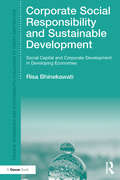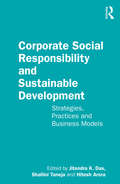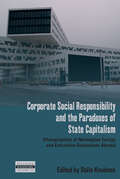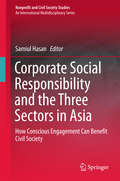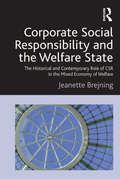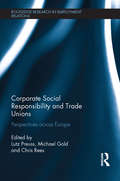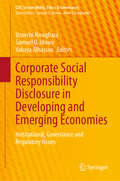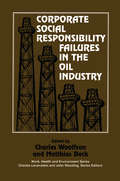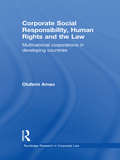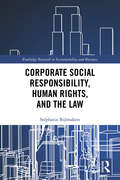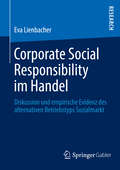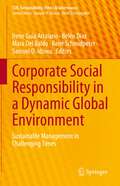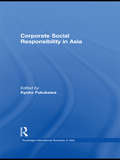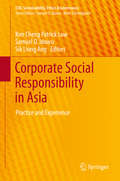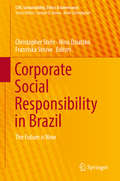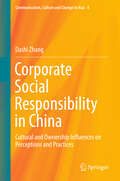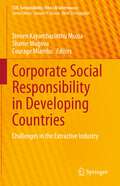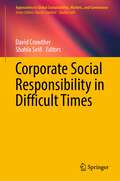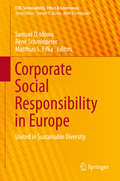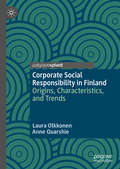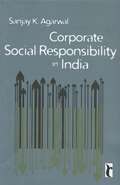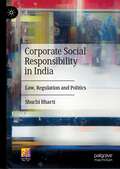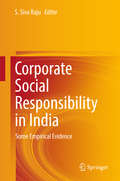- Table View
- List View
Corporate Social Responsibility and Sustainable Development: Social Capital and Corporate Development in Developing Economies (Finance, Governance and Sustainability)
by Risa BhinekawatiMany different companies can significantly contribute to the integrated goals and targets of the United Nations’ sustainable development goals, such as poverty reduction by 2030. Poverty is not only about people living on less than $1.25 per day, but more fundamentally, it is their lack of capabilities and access to participate in productive economic activities. If companies can contribute in order to provide access and the necessary skills, then individuals will have the capabilities to achieve their aspirations, including earning a higher income. Corporate Social Responsibility and Sustainable Development supports Sen’s assertions that poverty can be alleviated if the capability of individuals is improved. Beyond that, this book shows that sustainable development goals can be achieved when the company’s CSR programs and social capital development in improving people’s capabilities are combined with necessary finance access and market access for the poor. The theoretical model developed from the journey of Astra International, one of the largest public-listed companies in Indonesia, is replicable for other companies aspiring to be sustainable in developing countries. The model shows a virtuous cycle between the corporate aim, CSR programs, social capital and corporate sustainability. This volume is of great value to academics, practitioners and policy makers interested in the themes of CSR, social capital and sustainable development of developing countries. It also appeals to professionals in industry associations, development agencies and international organizations, as well as NGOs that are concerned with the achievement of sustainable development goals by 2030.
Corporate Social Responsibility and Sustainable Development: Strategies, Practices and Business Models
by Jitendra K. Das; Shallini Taneja; Hitesh AroraThis book critically analyzes the role of corporate social responsibility (CSR) in achieving sustainable development in emerging economies. It brings together recent developments, effective frameworks, business models, and strategies adopted by companies and looks at how they contribute to sustainable business growth. The volume discusses diverse themes such as green marketing for promoting sustainable development; digitization and sustainability concerns; communication strategies for CSR; ethical standards in Indian advertising; microfinance as an instrument for achieving sustainable development; the role of CSR in the Skill India initiative; and CSR activities of Indian listed companies. It also provides solutions to challenges in achieving sustainable development goals at local and global levels. Drawing on in-depth case studies, the book will be an essential read for corporate professionals, students, and researchers of CSR, management studies, development studies, business studies, economics, environmental studies, green marketing, and sociology. It will also be relevant for policy makers, NGOs, public and private sector corporations, and consultants in sustainability reporting, business ethics, and sustainable development.
Corporate Social Responsibility and the Paradoxes of State Capitalism: Ethnographies of Norwegian Energy and Extraction Businesses Abroad (Dislocations #33)
by Ståle KnudsenThrough a series of case studies in diverse regions of the world, this book explores how transnational Norwegian energy and extractive industries handle corporate social responsibility (CSR) when operating abroad in places such as China, Brazil, and Turkey. With significant state ownership and embeddedness in the Nordic societal model, Norwegian capitalism is often represented as “benign” or ethical. By tracing CSR policy and practice—from headquarters to operations—this volume critically explores the workings of Norwegian corporate capitalism and its engagement with key issues of responsibility, accountability, and sustainability.
Corporate Social Responsibility and the Supply Chain: CSR Collaboration with Suppliers (Routledge Open Business and Economics)
by Monika JedynakDue to the growing importance of global interdependencies, corporate social responsibility has become an important issue both for the business and the entire society. Customers expect corporate social responsibility, and if an organization is insensitive to these issues, it runs the risk of losing its key customers. The interaction and integration of corporate social responsibility and supply chain management have led to the emergence of sustainable supply chain management. This book is a comprehensive study that deals with the subject of collaboration with suppliers, considering the CSR guidelines. It presents new research about suppliers, their importance in supply chains, and in the context of social responsibility and acts as a new source of content that fills the gap in this area. It may be of interest to researchers interested in CSR as well as supply chains, business relations, and, broadly understood, collaboration. It provides knowledge to many recipients including scientists and researchers, advanced students, and graduates.The Open Access version of this book, available at www.taylorfrancis.com, has been made available under a Creative Commons Attribution-Non Commercial-No Derivatives (CC-BY-NC-ND) 4.0 license.Any third party material in this book is not included in the OA Creative Commons license, unless indicated otherwise in a credit line to the material. Please direct any permissions enquiries to the original rightsholder.The publication has been supported by a grant from the Faculty of Management and Social Communication under the Strategic Programme Excellence Initiative at Jagiellonian University.
Corporate Social Responsibility and the Three Sectors in Asia: How Conscious Engagement Can Benefit Civil Society (Nonprofit and Civil Society Studies)
by Samiul HasanThis volume investigates how much governmental control is needed to reign in corporate and business greed and to make business "socially responsible" in Asia. It also questions whether business entities need to be reigned in by the government itself, or if other social, religious, or economic dynamics shape business entities in Asia. Moreover, it looks at how the Asian third sector influences BSR/CSR activities.
Corporate Social Responsibility and the Welfare State: The Historical and Contemporary Role of CSR in the Mixed Economy of Welfare
by Jeanette BrejningOver the past four decades many European welfare states have seen an increasing involvement of the commercial sector in their mixed economies of welfare. One aspect of this development that has yet to be fully understood in social policy analysis is the engagement of businesses to address social problems, such as social exclusion, through activities labelled as 'corporate social responsibility' ('CSR'). Although CSR has gained increasing currency on both national and international policy agendas since the 1990s, it remains a topic which is predominantly researched in business schools and from a business perspective. This book aims to redress this imbalance by focusing on the social aspect of CSR. Based on interviews with a wide spectrum of people who work with CSR professionally in England, Denmark and in the EU Commission, the book argues that when CSR is linked to social exclusion it is a way of renegotiating responsibilities in mixed economies of welfare. The book also offers a comprehensive historical understanding of CSR as it traces the emergence and development of CSR in West European welfare economies as diverse as England, Denmark, Sweden, Norway, Germany and France. By situating CSR within the conceptual framework of the mixed economy of welfare and using Historical Institutionalism as a theoretical perspective to explore and explain the relationship between the welfare state and CSR, this book makes an innovative contribution to critical debates in comparative social policy.
Corporate Social Responsibility and Trade Unions: Perspectives across Europe (Routledge Research in Employment Relations)
by Lutz Preuss Michael Gold Chris ReesGrowing interest in corporate social responsibility (CSR) has focused attention on the relationship between businesses and key stakeholders, such as NGOs and local communities. Curiously, however, commentators on CSR rarely discuss the role of trade unions, while commentators on employment relations seldom engage with CSR. This situation is all the more remarkable since unions are a critically important social actor and have traditionally played a prominent role in defending the interests of one key stakeholder in the company, the employee. Written by dedicated experts in their field, this book addresses a key gap in the literature on both CSR and employment relations, namely trade union policies towards CSR, as well as union engagement with particular CSR initiatives and the challenges they face in doing so. The research covers eleven European countries which, when taken together, constitute a representative sample of industrial relations structures across the continent. This book will be essential reading for scholars, students and practitioners of international business, employment relations, public policy and CSR. Its foreword is written by Philippe Pochet and Maria Jepsen, Directors of the European Trade Union Institute in Brussels.
Corporate Social Responsibility Disclosure in Developing and Emerging Economies: Institutional, Governance and Regulatory Issues (CSR, Sustainability, Ethics & Governance)
by Uzoechi Nwagbara Samuel O. Idowu Yahaya AlhassanThis book offers a new, nuanced, and comprehensive look at how CSR is practiced and disclosed in terms of corporate transparency, sustainability, and accountability, from the perspective of developing and emerging economies. Given the importance and power of emerging economies in shaping global gross domestic product (GDP), entrepreneurship, and corporate investment, it is crucial to examine this phenomenon in terms of corporate sustainability and achieving the ideals of the Sustainable Development Goals (SDGs) for a more sustainable future. The book therefore addresses contextual institutional, regulatory, and governance issues in these regions to contribute to the debate as well as a rethinking of the motivation for CSR practice and reporting. The book will be of interest to researchers, practitioners, and students.
Corporate Social Responsibility, Entrepreneurship, and Innovation (Routledge Studies in Business Ethics #6)
by Kenneth Amaeshi Paul Nnodim Osuji OnyekaDespite its recent popularity in literature, theory, and practice, Corporate Social Responsibility (CSR) remains a vague concept that struggles to define itself beyond the confines of corporate philanthropy or sustainability. In some circles, it is a response to the present and anticipated climate change challenges, while in others it focuses on fair trade, corporate governance, and responsible investment. What then is CSR, and how do we understand its purpose? In Corporate Social Responsibility, Entrepreneurship, and Innovation, authors Kenneth Amaeshi and Paul Nnodim consider the governance of corporate externalities (positive and negative impacts of firms on society and the environment) as the main thrust of the CSR discourse – a field that hitherto only the state has regulated, with sometimes coercive actions. This book contributes to the theorization of CSR by presenting the meaning of CSR in a clear and distinct manner, giving the ongoing CSR debate a new direction anchored on a firm economic philosophy. It reinforces the view of firms as social institutions as well as economic actors, establishing CSR as a form of justice rather than philanthropy. Articulating CSR as private governance of corporate externalities, for the first time, this book provides researchers with a new paradigm to translate knowledge into action and offers reflective managers an alternative framework in which to explore their corporate strategies and decisions.
Corporate Social Responsibility Failures in the Oil Industry
by Charles Woolfson and Matthias BeckCorporate Social Responsibility Failures in the Oil Industry directly challenges the oil industry's claims of corporate good citizenship, now widely advanced as part of a global public relations initiative. The volume spans the industry's reach, from the troubled waters of the UK offshore Continental Shelf, with its horrendous legacy of the Piper Alpha oil rig disaster, to the inhospitable shores of Newfoundland with its own tragic legacy of lost lives; to the new frontier of oil corporate colonialism in the former Soviet Union and the icy plains of Alaska. The central theme of violations of basic labour rights and of health and environmental protection standards will make uncomfortable reading in the boardroom. It is equally essential reading for those who seek to improve the position of workers and industries within the oil industry's global reach.
Corporate Social Responsibility, Human Rights and the Law: Multinational Corporations in Developing Countries (Routledge Research in Corporate Law)
by Olufemi AmaoThe control of multinational corporations is an area of law that has attracted immense attention both at national and international level. In recognition of the importance of the subject matter, the United Nations Secretary General has appointed a special representative to work in this area. The book discusses the current trend by MNCs to self regulate by employing voluntary corporate social responsibility (CSR) strategy. Olufemi Amao argues that the CSR concept is insufficient to deal with externalities emanating from MNCs’ operations, including human rights violations. Amao maintains that for CSR to be effective, the law must engage with the concept. In particular, he examines how the law can be employed to achieve this goal. While noting that the control of MNCs involves regulation at the international level, it is argued that more emphasis needs to be placed on possibilities at home, in States and host States where there are stronger bases for the control of corporations. This book will be useful to academic scholars, students, policy makers in developing countries, UN, UN Agencies, the African Union and its agencies, the European Union and its agencies and other international policy makers.
Corporate Social Responsibility, Human Rights and the Law (Routledge Research in Sustainability and Business)
by Stéphanie BijlmakersCorporate Social Responsibility, Human Rights and the Law examines the responsibilities of business enterprises for human rights from a legal perspective. It analyses the legal status of the ‘corporate responsibility to respect human rights’ as articulated by the United Nations Guiding Principles on Business and Human Rights (UNGPs). This concept currently reflects an international consensus and is promoted by the UN. The book contemplates the various founding perspectives of the UNGPs, and how the integration of notions such as ‘principled pragmatism’ and ‘polycentric governance’ within its framework provides insights into the future course of law and policy, compliance, and corporate respect for human rights. The book thus takes a global focus, examining the interaction of Corporate Social Responsibility (CSR), human rights, and the law in a broader global governance context. Setting out a possible future scenario for the legalization of the corporate responsibility to respect human rights that is informed by the UNGPs' founding perspectives and reflects current realities in the human rights landscape, this book will be of great interest to scholars of business ethics, international human rights law, and CSR more broadly.
Corporate Social Responsibility im Handel: Diskussion und empirische Evidenz des alternativen Betriebstyps Sozialmarkt
by Eva LienbacherHandelsunternehmen prägen und prägten das Wirtschaftsgeschehen und unsere Gesellschaft seit jeher wesentlich. Neben dem vorrangigen Bestreben, Gewinn zu generieren, verfolgen sie oftmals auch soziale Ziele. Der Beitrag dieser Arbeit ist die grundlegende, deskriptive Aufarbeitung der Forschungsströmung CSR im Handel sowie des alternativen Betriebstyps Sozialmarkt, ein Handelsunternehmen, dass die soziale Zielsetzung über die Gewinnorientierung stellt. Darüber hinaus werden generelle Erkenntnisse zu CSR und der CSR-Kommunikation auf den Lebensmitteleinzelhandel übertragen und konkrete Handlungsempfehlungen für die Marketingforschung und -praxis abgeleitet.
Corporate Social Responsibility in a Dynamic Global Environment: Sustainable Management in Challenging Times (CSR, Sustainability, Ethics & Governance)
by Irene Guia Arraiano Belén Díaz Mara Del Baldo René Schmidpeter Samuel O. IdowuThis book highlights the latest research on responsible business and its practical implications for the economy, society, academia, and politics. It presents selected contributions from respected scholars and experts who have conducted international research on corporate social responsibility, sustainability, ethics, corporate governance, finance, and responsible investing. The book examines the spreading and enhancement of CSR and sustainability at the micro, meso, and macro levels, especially in light of their increased relevance following the recent pandemic. Taken together, the results of the empirically and theoretically based contributions offer a unique and multi-faceted perspective on current global trends and expected developments in this area. They cover a wide range of contexts and situations, helping readers expand their knowledge and drive effective change to tap their organizations’ full potential.
Corporate Social Responsibility in Asia (Routledge International Business in Asia)
by Kyoko FukukawaCorporate Social Responsibility (CSR) is an important issue in contemporary business, management and politics, especially since the launch of the United Nations Global Compact in 2000 as an initiative to encourage businesses worldwide to adopt sustainable and socially responsible policies, and to report on them. This book examines the theory and practice of CSR in Asia. The philosophical and ideological underpinnings of CSR are rooted in Anglo-American and European principles of liberal democratic rights, justice and societal structures. This book not only considers the impact of Western CSR practices in Asia, but also provides much needed Asian perspectives on this issue. It investigates the operation of CSR in different countries across Asia, including China, Japan, Malaysia, Thailand and Bangladesh – comparing the different meanings given to CSR, and the varying degrees of success experienced in different national contexts. This book argues if CSR is ever to revolutionize the manner in which we trade then it is needs to open itself up to the full variety of social responsibility as it occurs around the world. The book re-maps and refines debates about CSR as a global phenomenon, and will be of great value to professionals making strategic decisions in the global business environment.
Corporate Social Responsibility in Asia: Practice and Experience (CSR, Sustainability, Ethics & Governance)
by Samuel O. Idowu Kim Cheng Patrick Low Sik Liong AngThis book presents a rich collection of research studies on the theory and practice of CSR in Asia. It includes valuable contributions of practice-oriented researchers from various Asian countries such as Brunei, China, India, Indonesia, Japan, Korea, Malaysia, and Singapore, and from several non-Asian countries, such as Australia, Canada and the USA. The book presents a comprehensive overview of the practice of CSR in Asia. Normally CSR is seen in the Western angles, but here, in this book, Asian philosophies and thoughts are also examined. Touted as the first of its kind, the book also compares Western and Asian perspectives on CSR and presents them in the light of Asian philosophies and thoughts, such as Confucian, Islamic (Koranic), Indian (Vedantic) and other Asian ways of looking at CSR in their own rights and perspectives.
Corporate Social Responsibility in Brazil: The Future is Now (CSR, Sustainability, Ethics & Governance)
by Christopher Stehr Franziska Struve Nina DziatzkoThis book examines the practice of corporate social responsibility (CSR) in Latin America, with a particular focus on Brazil. Drawing on historical developments and theoretical reflections alike, it introduces readers to the state of the art in Brazilian CSR. The authors present a range of regulatory and entrepreneurial frameworks that form the basis for business and CSR activities in Brazil. In a number of detailed case studies from various Brazilian institutions and enterprises, the book provides revealing insights into the practice of sustainable and responsible business conduct in this country. Subsequent chapters show the effects of anti-corruption laws, which have since informed corporations’ compliance agendas, and discuss recent, massive corruption scandals. Generally speaking, the book provides a highly informative and practice-oriented resource that successfully reconciles an ostensible contradiction – corporate social responsibility and Brazil.
Corporate Social Responsibility in China: Cultural and Ownership Influences on Perceptions and Practices (Communication, Culture and Change in Asia #4)
by Dashi ZhangThis book explores how the traditional Chinese culture and business ownership influence corporate social responsibility in China. By comparing state-owned enterprises, private companies and multinational companies, it shows how corporate social responsibility is perceived and practiced at the corporate level in these companies. It also studies how intertwined company practices and the Chinese culture are, and how this relationship affects the business environment in China. Further, it highlights the value of economic factors in corporate social responsibility, and the influence of Chinese philosophy on corporate ethics. It is a valuable tool for researchers and academics wishing to understand the dynamics of corporate social responsibility in China and discover the significant influencing factors in China's business arena.
Corporate Social Responsibility in Developing Countries: Challenges in the Extractive Industry (CSR, Sustainability, Ethics & Governance)
by Steven Kayambazinthu Msosa Shame Mugova Courage MlamboThis book examines corporate social responsibility theories and models in the context of developing countries. The developing countries are amongst the poorest countries of the world despite vast natural resources. The natural resources are mismanaged, proceeds are misappropriated, corruption and conflict are centered on resource control. Governments and Multinational Corporations (MNCs) are at the centre of the controversy of corporate social responsibility (CSR) in the affected countries. Moreover, the lack of systems, procedures and legislation to enforce CSR has led to environmental degradation and a decline in business ethics and morality. This book analyses Corporate Social Responsibility in developing countries with specific reference to the extractive industry by integrating academic and industrial perspectives. It will be of interest to researchers in the field of CSR, as well as for management professionals.
Corporate Social Responsibility in Difficult Times (Approaches to Global Sustainability, Markets, and Governance)
by David Crowther Shahla SeifiIt has been fairly traumatic for everyone and every organization over the last couple of years as we have had to deal with the coronavirus pandemic. It has certainly been a shock to the economic system of the world from which many are still recovering. Equally it has affected social systems and the environment, the effects of which are still being felt and will be felt for some time to come. In addition, there has been a fairly general economic crisis around the world as people struggle and adapt to the new environment. Certainly, there have been and will be changes which are likely to become permanent. While recovering from one crisis however another is becoming more significant as climate change and its effects start to become ever more apparent. So, it seems inevitable that difficult times will continue into the future. This book therefore sets out to examine aspects of the changes to corporate and institutional behaviour which have come about by the difficult times of needing to deal with past and future crises. The international origins of the contributors to this volume make this very original, taking some of the best ideas from around the world. This approach is based on the tradition of the Social Responsibility Research Network (SRRNet.org), which in its 20-year history has sought to broaden the discourse and to treat all research as inter-related and relevant to business. This tradition has always been to explore the subject widely and to seek relevant solutions, while also sharing best practice.
Corporate Social Responsibility in Europe: United in Sustainable Diversity (CSR, Sustainability, Ethics & Governance)
by Samuel O. Idowu René Schmidpeter Matthias S. FifkaThis book explores the current state of Corporate Social Responsibility (CSR) in 24 European nations, examining the state of the development and practice of CSR and sustainability for organizations in these countries. The common denominator for all of the book's 25 chapters is a management perspective rather than an ethical discourse. The book therefore represents a comprehensive survey of initiatives and activities in the field of CSR and provides a wealth of complete cases and examples for different approaches to sustainable and responsible management practice. The book also reviews the relevant political and governmental guidelines and frameworks for organizations, both on a national and a European level. Europe has taken a leading role in the promotion and implementation of CSR. This book showcases how, through CSR, enterprises can significantly contribute to achieving the European Union's treaty objectives of sustainable development and a highly competitive social market economy.
Corporate Social Responsibility in Finland: Origins, Characteristics, and Trends
by Laura Olkkonen Anne QuarshieThis book introduces a Finnish approach to corporate social responsibility (CSR) and embeds it within a broader discussion on the Nordic roots of business responsibility and stakeholder thinking. The first part of the book traces the origins of Finnish CSR from paternalism at the beginning of industrialization to the start of the welfare state. The second part discusses the characteristics of Finnish CSR in light of the cultural and societal context and structure, and the third part introduces current trends and challenges. Each section of the book includes case examples that illustrate Finnish CSR from different perspectives. The book will be of use to scholars and students with an interest in the Nordic approach to CSR.
Corporate Social Responsibility in India
by Sanjay K AgarwalCorporate Social Responsibility in India is arguably the first comprehensive, well-researched book on the subject in the country. The author uses Indian examples, case studies and CSR role models from the Indian industry to explain the gap between Indian business needs and current practices. Practices and researches in economically developed countries have also been used extensively. As the Indian industry begins to enter international markets, it is going to be imperative to integrate CSR with business goals for long-term sustainability and healthy economic, social and environmental impact. The book helps in understanding the meaning of business beyond financial numbers and tries to explain how even CSR can be used as a marketing tool and for business benefits. It dwells comprehensively upon the concept of CSR, from its inception as philanthropy till its journey to a form where now it is mandatory to be sensitive about CSR in businesses.
Corporate Social Responsibility in India: Law, Regulation and Politics
by Shuchi BhartiThe book explores how the influence by the corporate sector in the economic interactions globally leads to the international governance framework pertaining to CSR, that is primarily based on soft law attributes. Such international soft law regime uniquely influences the way the legal regime around CSR has shaped up in India. Through innovative methodology, the analysis of regulatory space and instruments and the structural framework construe the relationship between state and corporate sectors. It is necessary to investigate the two-fold relationship of state and corporate actors. The book takes up a regulatory, institutional and socio-political investigations through studying the case of CSR in India in the backdrop of the transformations taking place in national arena, its international inspirations and resulting regulatory model that evolve. How the existing regulatory space is affected? What are the implications on the regulatory instruments? The pursuit of the answers would also involve investigation of questions as to how the state-corporate relationship constructed, construed and conducted post state’s ratification of CSR. What are the reasons of such changes? What implications do the role of politics and corporate strategies have on the renewed interest in CSR? The book deals with these aforementioned aspects. This scholarly work synthesizes political, economic and legal aspects of the role of the state and corporate sector with narrowly defined focus of CSR which has the ability to provide a comprehensive broad-brushed account of the larger framework.
Corporate Social Responsibility in India: Some Empirical Evidence
by S. Siva RajuThis book presents the authors' recent field experiences of corporate social responsibility (CSR) activities in different regions of India. It also demonstrates how social auditing and stakeholder mapping help analyze the impact that particular individuals or groups may have on the functioning of any company in an area. CSR is a rapidly growing area of research and activity, especially in developing countries like India. An increasing number of companies are realizing their own social responsibility, given that they work within societal networks. As a result, any initiation or expansion activity they carry out in society impacts the communities around them. Given the newness of the field, the work on CSR in India is still in the initial stages. Most importantly, there is a need to highlight issues concerning CSR activities using sound methodologies and scientific data. A database comprising qualitative and quantitative approaches collected by tracking CSR activities is invaluable. Further the scientific data is vital to fully understand CSR, and in turn helps in designing appropriate and effective interventions for improving community members' quality of life. Accordingly, the stakeholders associated with CSR need to have a sound knowledge of how to conduct studies related to baseline data generation, community needs assessments, community profiling, stakeholder mapping, social impact assessments, monitoring and evaluation, as well as the social auditing of CSR projects and other related issues. This book aptly covers these issues and offers supporting empirical evidences from the field.
